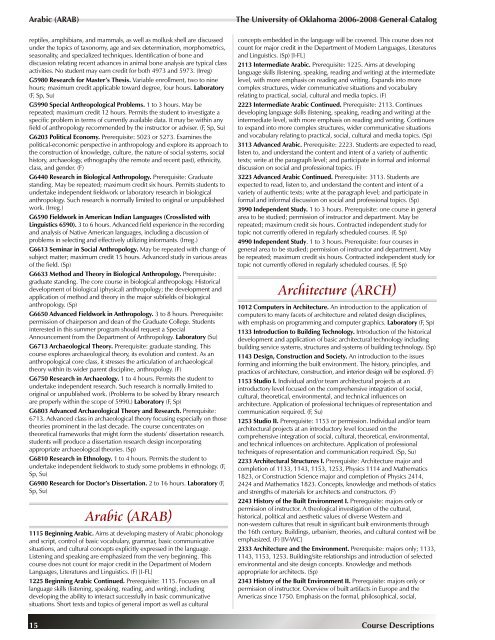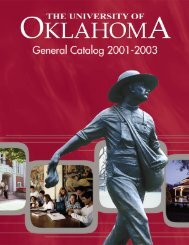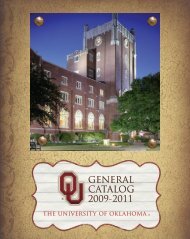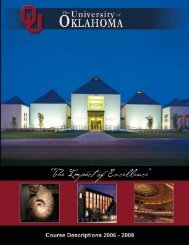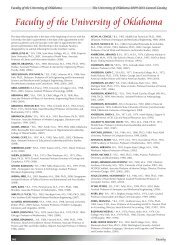ART - Catalog - University of Oklahoma
ART - Catalog - University of Oklahoma
ART - Catalog - University of Oklahoma
You also want an ePaper? Increase the reach of your titles
YUMPU automatically turns print PDFs into web optimized ePapers that Google loves.
Arabic (ARAB)<br />
The Uni ver sity <strong>of</strong> <strong>Oklahoma</strong> 2006-2008 Gen eral Cat a log<br />
reptiles, amphibians, and mammals, as well as mollusk shell are discussed<br />
under the topics <strong>of</strong> taxonomy, age and sex determination, morphometrics,<br />
seasonality, and specialized techniques. Identification <strong>of</strong> bone and<br />
discussion relating recent advances in animal bone analysis are typical class<br />
activities. No student may earn credit for both 4973 and 5973. (Irreg)<br />
G5980 Research for Master’s Thesis. Variable enrollment, two to nine<br />
hours; maximum credit applicable toward degree, four hours. Laboratory<br />
(F, Sp, Su)<br />
G5990 Special Anthropological Problems. 1 to 3 hours. May be<br />
repeated; maximum credit 12 hours. Permits the student to investigate a<br />
specific problem in terms <strong>of</strong> currently available data. It may be within any<br />
field <strong>of</strong> anthropology recommended by the instructor or adviser. (F, Sp, Su)<br />
G6203 Political Economy. Prerequisite: 5023 or 5273. Examines the<br />
political-economic perspective in anthropology and explore its approach to<br />
the construction <strong>of</strong> knowledge, culture, the nature <strong>of</strong> social systems, social<br />
history, archaeology, ethnography (the remote and recent past), ethnicity,<br />
class, and gender. (F)<br />
G6440 Research in Biological Anthropology. Prerequisite: Graduate<br />
standing. May be repeated; maximum credit six hours. Permits students to<br />
undertake independent fieldwork or laboratory research in biological<br />
anthropology. Such research is normally limited to original or unpublished<br />
work. (Irreg.)<br />
G6590 Fieldwork in American Indian Languages (Crosslisted with<br />
Linguistics 6590). 3 to 6 hours. Advanced field experience in the recording<br />
and analysis <strong>of</strong> Native American languages, including a discussion <strong>of</strong><br />
problems in selecting and effectively utilizing informants. (Irreg.)<br />
G6613 Seminar in Social Anthropology. May be repeated with change <strong>of</strong><br />
subject matter; maximum credit 15 hours. Advanced study in various areas<br />
<strong>of</strong> the field. (Sp)<br />
G6633 Method and Theory in Biological Anthropology. Prerequisite:<br />
graduate standing. The core course in biological anthropology. Historical<br />
development <strong>of</strong> biological (physical) anthropology; the development and<br />
application <strong>of</strong> method and theory in the major subfields <strong>of</strong> biological<br />
anthropology. (Sp)<br />
G6650 Advanced Fieldwork in Anthropology. 3 to 8 hours. Prerequisite:<br />
permission <strong>of</strong> chairperson and dean <strong>of</strong> the Graduate College. Students<br />
interested in this summer program should request a Special<br />
Announcement from the Department <strong>of</strong> Anthropology. Laboratory (Su)<br />
G6713 Archaeological Theory. Prerequisite: graduate standing. This<br />
course explores archaeological theory, its evolution and context. As an<br />
anthropological core class, it stresses the articulation <strong>of</strong> archaeological<br />
theory within its wider parent discipline, anthropology. (F)<br />
G6750 Research in Archaeology. 1 to 4 hours. Permits the student to<br />
undertake independent research. Such research is normally limited to<br />
original or unpublished work. (Problems to be solved by library research<br />
are properly within the scope <strong>of</strong> 5990.) Laboratory (F, Sp)<br />
G6803 Advanced Archaeological Theory and Research. Prerequisite:<br />
6713. Advanced class in archaeological theory focusing especially on those<br />
theories prominent in the last decade. The course concentrates on<br />
theoretical frameworks that might form the students’ dissertation research.<br />
students will produce a dissertation research design incorporating<br />
appropriate archaeological theories. (Sp)<br />
G6810 Research in Ethnology. 1 to 4 hours. Permits the student to<br />
undertake independent fieldwork to study some problems in ethnology. (F,<br />
Sp, Su)<br />
G6980 Research for Doctor’s Dissertation. 2 to 16 hours. Laboratory (F,<br />
Sp, Su)<br />
Arabic (ARAB)<br />
1115 Beginning Arabic. Aims at developing mastery <strong>of</strong> Arabic phonology<br />
and script, control <strong>of</strong> basic vocabulary, grammar, basic communicative<br />
situations, and cultural concepts explicitly expressed in the language.<br />
Listening and speaking are emphasized from the very beginning. This<br />
course does not count for major credit in the Department <strong>of</strong> Modern<br />
Languages, Literatures and Linguistics. (F) [I-FL]<br />
1225 Beginning Arabic Continued. Prerequisite: 1115. Focuses on all<br />
language skills (listening, speaking, reading, and writing), including<br />
developing the ability to interact successfully in basic communicative<br />
situations. Short texts and topics <strong>of</strong> general import as well as cultural<br />
concepts embedded in the language will be covered. This course does not<br />
count for major credit in the Department <strong>of</strong> Modern Languages, Literatures<br />
and Linguistics. (Sp) [I-FL]<br />
2113 Intermediate Arabic. Prerequisite: 1225. Aims at developing<br />
language skills (listening, speaking, reading and writing) at the intermediate<br />
level, with more emphasis on reading and writing. Expands into more<br />
complex structures, wider communicative situations and vocabulary<br />
relating to practical, social, cultural and media topics. (F)<br />
2223 Intermediate Arabic Continued. Prerequisite: 2113. Continues<br />
developing language skills (listening, speaking, reading and writing) at the<br />
intermediate level, with more emphasis on reading and writing. Continues<br />
to expand into more complex structures, wider communicative situations<br />
and vocabulary relating to practical, social, cultural and media topics. (Sp)<br />
3113 Advanced Arabic. Prerequisite: 2223. Students are expected to read,<br />
listen to, and understand the content and intent <strong>of</strong> a variety <strong>of</strong> authentic<br />
texts; write at the paragraph level; and participate in formal and informal<br />
discussion on social and pr<strong>of</strong>essional topics. (F)<br />
3223 Advanced Arabic Continued. Prerequisite: 3113. Students are<br />
expected to read, listen to, and understand the content and intent <strong>of</strong> a<br />
variety <strong>of</strong> authentic texts; write at the paragraph level; and participate in<br />
formal and informal discussion on social and pr<strong>of</strong>essional topics. (Sp)<br />
3990 Independent Study. 1 to 3 hours. Prerequisite: one course in general<br />
area to be studied; permission <strong>of</strong> instructor and department. May be<br />
repeated; maximum credit six hours. Contracted independent study for<br />
topic not currently <strong>of</strong>fered in regularly scheduled courses. (F, Sp)<br />
4990 Independent Study. 1 to 3 hours. Prerequisite: four courses in<br />
general area to be studied; permission <strong>of</strong> instructor and department. May<br />
be repeated; maximum credit six hours. Contracted independent study for<br />
topic not currently <strong>of</strong>fered in regularly scheduled courses. (F, Sp)<br />
Architecture (ARCH)<br />
1012 Computers in Architecture. An introduction to the application <strong>of</strong><br />
computers to many facets <strong>of</strong> architecture and related design disciplines,<br />
with emphasis on programming and computer graphics. Laboratory (F, Sp)<br />
1133 Introduction to Building Technology. Introduction <strong>of</strong> the historical<br />
development and application <strong>of</strong> basic architectural technology including<br />
building service systems, structures and systems <strong>of</strong> building technology. (Sp)<br />
1143 Design, Construction and Society. An introduction to the issues<br />
forming and informing the built environment. The history, principles, and<br />
practices <strong>of</strong> architecture, construction, and interior design will be explored. (F)<br />
1153 Studio I. Individual and/or team architectural projects at an<br />
introductory level focused on the comprehensive integration <strong>of</strong> social,<br />
cultural, theoretical, environmental, and technical influences on<br />
architecture. Application <strong>of</strong> pr<strong>of</strong>essional techniques <strong>of</strong> representation and<br />
communication required. (F, Su)<br />
1253 Studio II. Prerequisite: 1153 or permission. Individual and/or team<br />
architectural projects at an introductory level focused on the<br />
comprehensive integration <strong>of</strong> social, cultural, theoretical, environmental,<br />
and technical influences on architecture. Application <strong>of</strong> pr<strong>of</strong>essional<br />
techniques <strong>of</strong> representation and communication required. (Sp, Su)<br />
2233 Architectural Structures I. Prerequisite: Architecture major and<br />
completion <strong>of</strong> 1133, 1143, 1153, 1253, Physics 1114 and Mathematics<br />
1823, or Construction Science major and completion <strong>of</strong> Physics 2414,<br />
2424 and Mathematics 1823. Concepts, knowledge and methods <strong>of</strong> statics<br />
and strengths <strong>of</strong> materials for architects and constructors. (F)<br />
2243 History <strong>of</strong> the Built Environment I. Prerequisite: majors only or<br />
permission <strong>of</strong> instructor. A theological investigation <strong>of</strong> the cultural,<br />
historical, political and aesthetic values <strong>of</strong> diverse Western and<br />
non-western cultures that result in significant built environments through<br />
the 16th century. Buildings, urbanism, theories, and cultural context will be<br />
emphasized. (F) [IV-WC]<br />
2333 Architecture and the Environment. Prerequisite: majors only; 1133,<br />
1143, 1153, 1253. Building/site relationships and introduction <strong>of</strong> selected<br />
environmental and site design concepts. Knowledge and methods<br />
appropriate for architects. (Sp)<br />
2343 History <strong>of</strong> the Built Environment II. Prerequisite: majors only or<br />
permission <strong>of</strong> instructor. Overview <strong>of</strong> built artifacts in Europe and the<br />
Americas since 1750. Emphasis on the formal, philosophical, social,<br />
15 Course Descriptions


